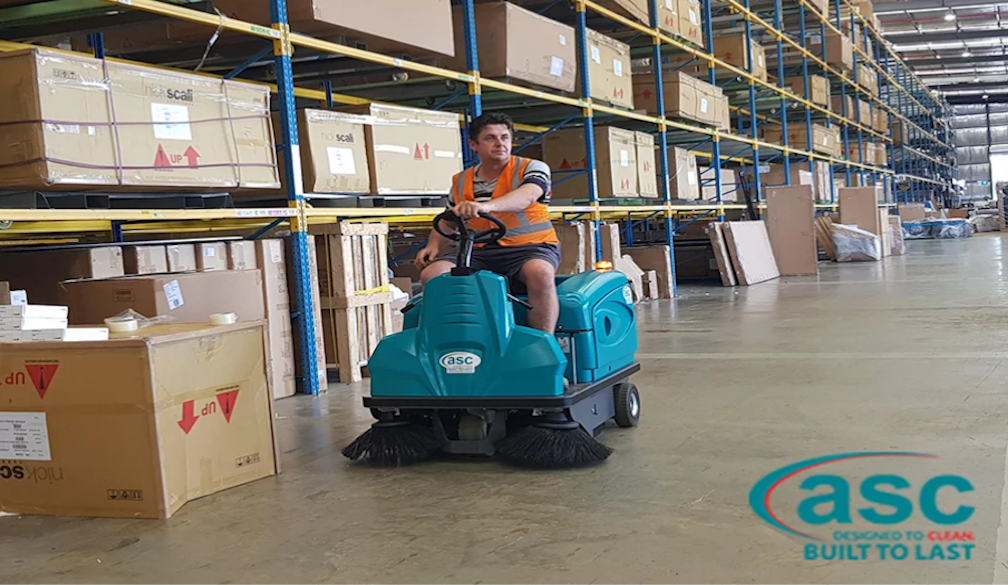5 Industries That Benefit Most from Commercial Floor Scrubbers

Clean floors show that you care about safety as well as hygiene and presentation. In busy workplaces, though, keeping large floors spotless isn’t easy. That’s where commercial cleaning machines, such as floor scrubbers, make a real difference.
Floor scrubbers clean faster and use less water, leaving the floor dry to walk on. Let’s look at five industries that gain the most from using them.
What makes floor scrubbers useful across industries?
No matter your industry, you will have to deal with heavy foot traffic, dirt, and spills at some point or another.
Floor scrubbers solve these problems by combining cleaning, scrubbing, and drying in one motion.
Here’s what makes them practical for many businesses:
i). Time-saving: Cover large spaces quickly.
ii). Cleaner results: Deep clean that removes grime and bacteria.
iii). Better safety: Dry floors mean fewer slips and falls.
iv). Cost control: Less water and cleaning chemicals are used.
v). Ease of use: Modern models are simple to operate.
Now let’s see which industries get the biggest benefits.
1. Warehouses and logistics
Warehouses are busy and often dirty. Forklifts, pallets, and staff constantly move across the floor. Dust, oil, and debris collect fast. A mop can’t keep up.
A floor scrubber can. It lifts grime and oil from concrete floors and leaves a clean, dry surface. This keeps your team safe and helps prevent costly accidents.
You can also clean more often without stopping work for hours. For warehouses running long shifts, that’s a big advantage. Regular cleaning protects your floors and helps you meet health and safety standards.
Choose a ride-on scrubber for large distribution areas and a walk-behind model for tighter spaces like loading docks.
2. Retail and shopping centres
Dirty or sticky floors make a bad impression and can even drive people away. In retail, presentation matters.
Floor scrubbers help you maintain spotless surfaces with minimal disruption. They clean large areas fast, even during trading hours. Many modern models run quietly, so customers aren’t disturbed.
You’ll also use less water and cleaning solution. That means fewer wet-floor signs and safer spaces for everyone. Go for a compact, battery-powered scrubber for smaller stores where mobility and quiet operation are key.
3. Healthcare facilities
Hospitals, clinics, and aged-care centres demand the highest cleaning standards. Floors must stay spotless and dry to reduce the spread of germs. Manual cleaning can leave moisture behind, which increases the risk of bacteria and slips.
Floor scrubbers remove dirt and disinfect in one go. Their powerful suction leaves the surface dry almost instantly. This means fewer hazards and a safer space for patients, staff, and visitors.
They also reach under beds and around corners that are tricky with mops. Regular scrubbing helps meet hygiene requirements under healthcare cleaning standards.
Choose a model with chemical dosing control to avoid overusing cleaning agents while keeping floors sanitised.
4. Education and public buildings
Schools, universities, and libraries see hundreds or thousands of people each day. Mud, food, and dust quickly build up. Cleaners have limited time between classes or after hours.
A commercial floor scrubber makes that job faster and easier. It covers large hallways, cafeterias, and gym floors in less time. Clean, dry floors also reduce slip risks for students and staff.
Cleaner floors also improve air quality by removing dust instead of spreading it around. For public buildings, that means a more comfortable and welcoming space for everyone.
Pick a battery-operated scrubber for quiet operation during class hours or library use.
5. Manufacturing and food production
Factories and food production plants deal with grease, debris, and spills daily. Floors can become slippery fast, raising the risk of injury and contamination.
Heavy-duty floor scrubbers keep these environments safe and compliant. They handle oils, fats, and fine particles that ordinary cleaning can’t remove. For food-related industries, this helps meet hygiene and food safety standards.
In manufacturing, a clean floor also reduces wear on equipment and forklifts. Dust and grit can damage machinery over time. Keeping floors clean protects both your people and your investment.
Choose an industrial-grade scrubber with strong suction and durable brushes designed for heavy use.
How to choose the right commercial floor scrubber?
Not all scrubbers suit every workplace. Picking the right one depends on your space, surface, and cleaning needs.
Here’s what to think about before you buy:
i). Size of area: Larger spaces benefit from ride-on models. Smaller areas suit walk-behind scrubbers.
ii). Floor type: Smooth concrete, tiles, or vinyl, each needs different brush heads.
iii). Battery life: Long runtimes are ideal for big jobs.
iv). Noise level: Important for retail, schools, and hospitals.
v). Maintenance: Choose a model that’s easy to clean and service.
You can also speak with trusted suppliers of commercial cleaning machines who understand local business needs. They can help match your site to the right model and offer reliable after-sales support.
Closing Thought
Across industries, floor scrubbers save time, improve safety, and help you meet cleaning standards. They’re easy to use and deliver better results than manual methods. Clean, dry floors create a safer, more professional environment for everyone who walks through your doors.
Investing in a floor scrubber is a practical choice that pays off. It keeps your space looking sharp, reduces maintenance costs, and helps your business run more smoothly every day.

















